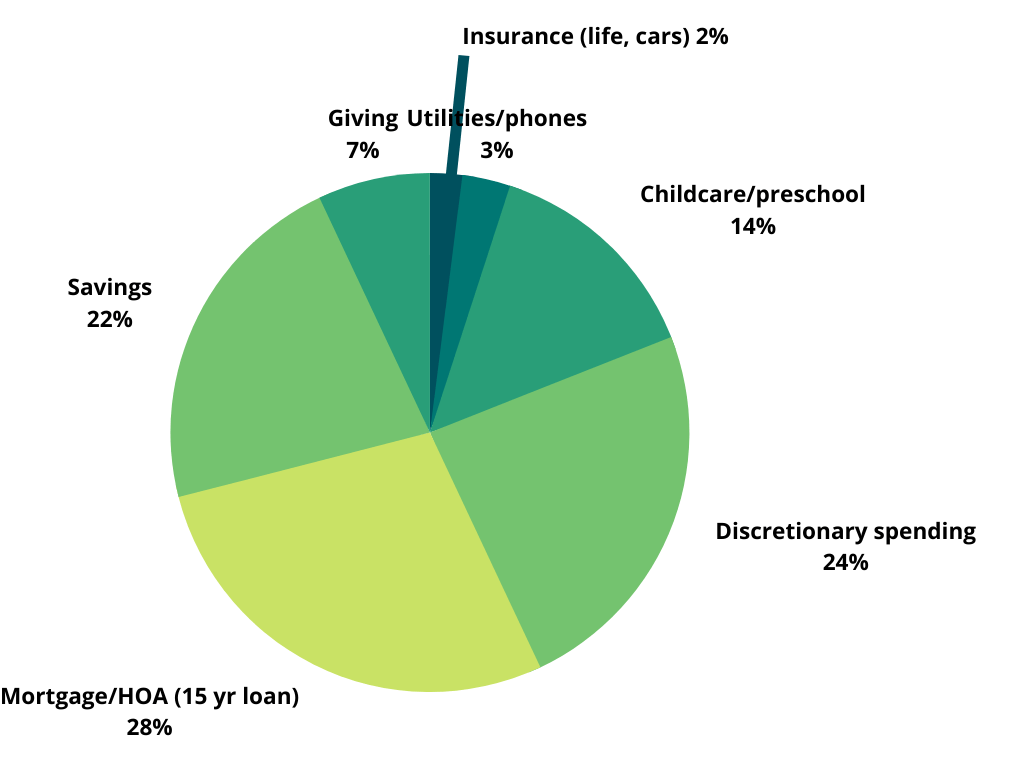The key principles of Biblical wealth involve recognizing God as the source of all blessings and using our resources to honor Him:
- Gratitude for God’s provisions
- Generosity in giving
- Wise stewardship of resources
- Contentment with what you have
- Ethical financial practices
- Using wealth to advance God’s kingdom
Money and wealth have always been topics of interest and debate among Christians. As a believer who has grappled with these issues myself, I have spent years studying what the Bible says about prosperity. What I have learned has transformed my perspective on wealth and how to handle it in a way that honors God.
In this blog post, we will explore biblical wealth and God’s perspective on prosperity. we will examine key scriptures, practical principles, and how to align our financial practices with biblical teachings. Whether you are struggling financially or blessed with abundance, this post will provide valuable insights to help you navigate wealth from a godly perspective.
Throughout this post, I will share personal stories and lessons I have learned along the way. My goal is to help you develop a biblical understanding of wealth that will impact not just your finances, but your entire approach to life and faith.
Let’s begin our journey by exploring what the Bible really says about wealth and prosperity.
Aspects of Biblical Wealth
Spiritual Wealth
- Faith: 🕊️ Trust in God
- Wisdom: 📖 Understanding God’s Word
- Peace: 🌿 Inner Tranquility
- Joy: 😊 Lasting Happiness
- Hope: 🌟 Confidence in God’s Promises
Material Wealth
- Provision: 🍞 Basic Needs Met
- Stewardship: 💼 Responsible Management
- Generosity: 🎁 Sharing Blessings
- Work: 🛠️ Honoring God through Labor
- Contentment: 🧘 Satisfaction with What You Have
Relational Wealth
- Love: ❤️ Demonstrating God’s Love
- Community: 🏘️ Supportive Faith Community
- Family: 👨👩👧👦 Strong Family Bonds
- Service: 🤲 Helping Others
- Forgiveness: 💖 Practicing Reconciliation
The True Nature of Biblical Wealth
When we think about wealth, our minds often jump straight to money and material possessions. But as I have studied the Bible and experienced God’s blessings in my own life, I have come to understand that biblical wealth is so much more than that.
Biblical wealth encompasses not just material riches, but also spiritual abundance, strong relationships, and a sense of purpose aligned with God’s will. It’s about recognizing that everything we have comes from God and using those resources to honor Him and bless others.
God as the Source of All Wealth
One of the foundational principles of biblical wealth is acknowledging God as the source of all blessings. Deuteronomy 8:18 reminds us, “But remember the Lord your God, for it is he who gives you the ability to produce wealth.”
This verse hit home for me when I landed my first big business deal as a freelancer. I was tempted to pat myself on the back for my hard work and skills. But as I reflected on this scripture, I realized that even my abilities and opportunities were gifts from God. This shifted my perspective from pride to gratitude.
The Purpose of Prosperity
God doesn’t bless us with wealth simply for our own enjoyment or status. The Bible teaches that prosperity has a greater purpose. 2 Corinthians 9:11 states, “You will be enriched in every way so that you can be generous on every occasion.”
I have seen this play out in my own life. As my income grew, so did my ability to support causes I cared about. I found joy in being able to contribute more to my church, support children in need, and help friends going through hard times. Wealth became a tool for blessing others and advancing God’s kingdom.
Biblical Principles for Managing Wealth
Now that we understand the nature and purpose of biblical wealth, let’s explore some key principles for managing our resources in a way that aligns with God’s perspective.
1. Practice Wise Stewardship
Luke 16:10 teaches, “Whoever can be trusted with very little can also be trusted with much.” This principle of stewardship has guided my financial decisions for years.
To me, stewardship means:
- Budgeting carefully
- Avoiding wasteful spending
- Investing wisely
- Using resources efficiently
I have found that when I manage my money with care, even in small amounts, God often entrusts me with more. It’s not about hoarding wealth, but about demonstrating responsibility with what we have been given.
2. Cultivate Generosity
Proverbs 11:24-25 says, “One person gives freely, yet gains even more; another withholds unduly, but comes to poverty. A generous person will prosper; whoever refreshes others will be refreshed.”
Generosity is at the heart of biblical wealth management. It’s not just about giving to your church, though that’s important. It’s about developing a generous spirit in all areas of life.
I have made it a practice to set aside a portion of my income for giving, beyond my regular offering. This has allowed me to respond quickly when needs arise, whether it’s supporting a friend or helping a neighbor in crisis.

3. Avoid the Love of Money
1 Timothy 6:10 warns us that “the love of money is a root of all kinds of evil.” This doesn’t mean money itself is evil, but that our attitude towards it can lead us astray.
I have seen friends fall into this trap, becoming obsessed with wealth accumulation at the expense of their relationships and spiritual health. To guard against this, I regularly examine my motives and attitudes towards money. Am I finding my security in my bank account or in God? Am I using my resources to serve others or just myself?
4. Practice Contentment
“Keep your lives free from the love of money and be content with what you have,” advises Hebrews 13:5. Contentment is a powerful antidote to greed and materialism.
This principle was particularly challenging for me early in my career. I often compared myself to peers who seemed more successful, driving nicer cars or living in bigger homes. Learning to be content with what God had provided freed me from a lot of stress and envy.
Contentment does not mean lack of ambition. Rather, it’s about finding joy and gratitude in your current circumstances while still working towards goals.
5. Plan for the Future
While trusting God for provision, the Bible also encourages wise planning. Proverbs 21:20 says, “The wise store up choice food and olive oil, but fools gulp theirs down.”
This principle has guided my approach to saving and investing. I set aside money for emergencies, for retirement, and make strategic investments. However, I always hold these plans loosely, recognizing that ultimately, my future is in God’s hands.
Stages of Financial Planning
Emergency Fund (0-12 Months)
- 🐖 Save 3-6 months of expenses
- 🏦 Open high-yield savings account
Debt Repayment (1-5 Years)
- 💳 Pay off high-interest debt
- 📈 Focus on repayment plans
Long-Term Savings (5-10 Years)
- 🏠 Save for major life goals
- 💼 Invest in diversified portfolios
Retirement Planning (20-40 Years)
- 💼 Contribute to retirement accounts
- 📈 Maximize employer match
6. Use Wealth Ethically
James 5:1-6 strongly condemns those who gain wealth through exploitation or unjust means. As Christians, we are called to use wealth ethically and fairly.
In my business dealings, I strive to be fair in my pricing, and honest in all transactions. I have turned down opportunities that might have been profitable but didn’t align with my values. Ethical wealth creation might sometimes mean slower growth, but it brings peace of mind and honors God.
Overcoming Common Misconceptions About Biblical Wealth
As we discuss biblical wealth, it’s important to address some common misconceptions that often create confusion or controversy among believers.
Misconception 1: “Poverty is More Spiritual Than Wealth”
Some Christians believe that being poor somehow makes you more spiritual or closer to God. However, the Bible doesn’t teach this. While Jesus warns about the dangers of riches, He also had wealthy followers who used their resources to support His ministry.
What matters is not how much or how little you have, but your heart attitude and how you use what God has given you.
Misconception 2: “If I’m Right with God, I’ll Be Wealthy”
On the flip side, the prosperity gospel teaches that financial wealth is a sign of God’s favor and that poverty indicates a lack of faith. This oversimplification is not supported by Scripture.
While God does bless His people, sometimes materially, faith does not guarantee wealth. Many faithful believers throughout history and around the world today are not wealthy, so to say. Our ultimate treasure is in heaven, not on earth.
Misconception 3: “Money is the Root of All Evil”
This is a misquote of 1 Timothy 6:10, which actually says the love of money is a root of all kinds of evil. Money itself is neutral – it can be used for great good or great harm. It’s our attitude towards money and how we use it that matters.
Statistics on Charitable Giving and its Impact
| Category | Statistic | Reference |
| Total Global Contributions | $500 billion in 2022 | Global Philanthropy Report |
| Total U.S. Contributions | $484.85 billion in 2022 | Giving USA 2023 |
| Source of U.S. Donations | Individuals: 67%, Foundations: 19%, Bequests: 9%, Corporations: 5% | Giving USA 2023 |
| Donation by Sector (U.S.) | Religious Organizations: 28%, Education: 15%, Human Services: 12%, Health Organizations: 9% | Giving USA 2023 |
| Health Sector Impact | Significant contributions to medical research, patient care, and public health initiatives | Gates Foundation |
| Education Impact | Supports scholarships, research, infrastructure development, and educational programs | Global Partnership for Education |
| Poverty Alleviation Impact | Provides food, shelter, and economic development initiatives to poverty-stricken areas | Oxfam |
| Environmental Impact | Focuses on conservation, climate change mitigation, and promoting sustainable practices | WWF |
| Online Giving | Online donations account for approximately 13% of all charitable giving in the U.S. | Blackbaud Institute |
| Corporate Social Responsibility (CSR) | Increasing integration into business models, corporate donations, and volunteerism | Forbes on CSR |
| Impact Investing | Investments made with the intention of generating social and environmental benefits alongside financial returns | GIIN |
Practical Steps for Aligning Your Finances with Biblical Principles
Now that we have explored the biblical perspective on wealth and addressed some misconceptions, let us look at some practical steps you can take to align your finances with these principles.
- Tithe and Give Generously: Start by setting aside a portion of your income for giving. This could be the traditional 10% tithe to your church, plus additional giving to causes you care about.
- Create a Budget: A budget helps you be a good steward of your resources. Track your income and expenses, and make sure your spending aligns with your values.
- Live Below Your Means: Avoid the trap of lifestyle inflation. Just because you can afford something doesn’t mean you need to buy it.
- Save and Invest Wisely: Build an emergency fund, save for future goals, and invest for long-term growth. Seek advice from godly financial advisors if needed.
- Avoid Unnecessary Debt: While some debt (like a mortgage) can be a tool, avoid consumer debt that can lead to financial bondage.
- Educate Yourself: Continuously learn about personal finance and biblical principles of wealth management.
- Practice Gratitude: Regularly thank God for His provisions, whether big or small. This cultivates contentment and counters greed.
- Use Your Skills to Generate Wealth: Remember that wealth creation is not just about money management – it’s also about using your God-given abilities to create value.
- Seek Accountability: Find a mentor or join a group of believers who can help you stay on track with your financial goals and spiritual priorities.
- Pray About Your Finances: Invite God into your financial decisions, seeking His wisdom and guidance.
The Impact of Biblical Wealth Management on Your Life and Faith
When you start managing your wealth according to biblical principles, you will likely see impacts that go far beyond your bank account.
In my own life, I have experienced:
- Greater peace and less anxiety about money
- Increased joy in giving and helping others
- Stronger faith as I have seen God’s provision
- Improved relationships as money became a tool for blessing, not a source of conflict
- A clearer sense of purpose in my work and earning
Biblical wealth management isn’t just about following rules or managing money. It’s about aligning your entire life with God’s purposes and experiencing the freedom and joy that comes from using your resources in the way they were intended.
Conclusion
Understanding biblical wealth and aligning our finances with God’s principles is a lifelong journey. It requires constant learning, regular self-examination, and a willingness to go against the materialistic currents of our culture.
Remember, true prosperity in God’s eyes is not measured by the size of your bank account, but by the richness of your relationship with Him and the impact you are making for His kingdom.
As you apply these principles, may you experience the truth of Proverbs 10:22: “The blessing of the Lord brings wealth, without painful toil for it.” Not wealth free from work or responsibility, but wealth that comes as a result of honoring God with your resources and trusting in His provision.
Let’s strive to be people who handle wealth in a way that reflects God’s character – with wisdom, generosity, and a focus on eternal values.
Frequently Asked Questions About Biblical Wealth
- What does the Bible say about wealth and prosperity? The Bible presents a balanced view of wealth. It’s seen as a blessing from God, but also comes with responsibilities. Scripture encourages generosity, wise stewardship, and using wealth to honor God and help others. It also warns against the love of money and the dangers of greed.
- Is it wrong for Christians to be wealthy? No, it’s not inherently wrong for Christians to be wealthy. The Bible does not condemn wealth itself, but rather the misuse of wealth and the love of money. What matters is how wealth is acquired and how it’s used.
- How can I increase my wealth in a biblical way? Biblical wealth increase involves working diligently, being a wise steward of resources, avoiding debt, saving and investing prudently, and seeking God’s guidance in financial decisions. It also means recognizing that all wealth ultimately comes from God.
- What does the Bible say about giving and tithing? The Bible encourages generous giving. The Old Testament established a tithe (10% of income) as a standard, while the New Testament emphasizes cheerful, generous giving from the heart. Giving is seen as an act of worship and a way to support God’s work.
- How can I balance saving for the future with being generous now? Biblical wisdom encourages both saving and giving. You can balance these by creating a budget that includes both savings and charitable giving. Remember, generosity is not just about money – you can also be generous with your time and talents.
- What’s the difference between the prosperity gospel and biblical teaching on wealth? The prosperity gospel teaches that financial blessing is always God’s will for Christians and that faith will always result in wealth. Biblical teaching, however, recognizes that God’s blessings aren’t always material and that faith does not guarantee wealth.
- How can I develop contentment with my financial situation? Contentment comes from recognizing God’s provision, focusing on eternal values rather than material possessions, practicing gratitude, and finding joy in using what you have to serve God and others.
- What does the Bible say about debt? The Bible generally discourages debt, describing the borrower as a slave to the lender (Proverbs 22:7). While it doesn’t prohibit all debt, it encourages living within one’s means and paying what we owe.
- How can I teach my children about biblical wealth principles? Model good stewardship, involve them in budgeting and giving decisions, teach them to save and give from their own money, and discuss biblical principles about money. Help them understand that everything we have comes from God.
- Is it okay to enjoy wealth, or should Christians live as simply as possible? It’s okay to enjoy the blessings God provides, including material blessings. However, we should hold possessions loosely, avoid extravagance, and be willing to use our resources for God’s purposes. The key is to find joy in God rather than in possessions.










